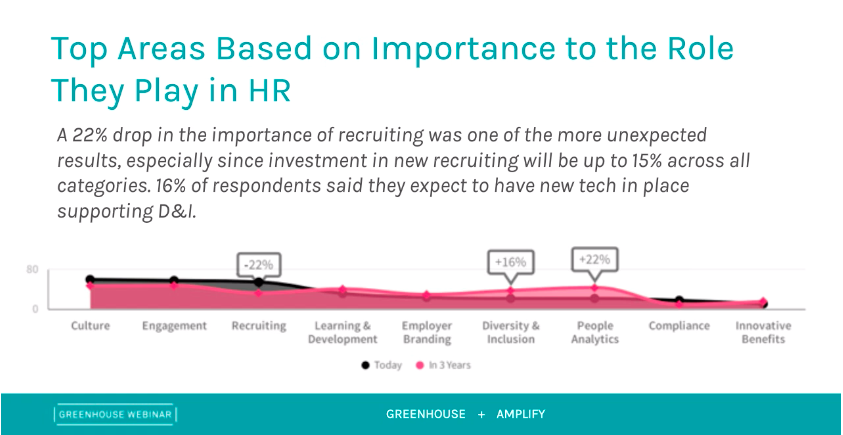Future-proofing your career: Here’s What you need to know

Lars Schmidt doesn’t want you to fall for the “hype bubbles” that permeate the blogosphere. Instead, he wants you to have real data so you can make informed decisions for your company and your career. How can you achieve that? Keep reading!
You may know Lars as the founder of Amplify and co-founder of HR Open Source, a global community of practitioners that accelerates HR best practices by sharing case studies, tools and templates. He’s also the co-author of Employer Branding for Dummies and a regular contributor to Fast Company. Prior to taking on these roles, Lars worked as a recruiter for 20 years, running corporate recruiting at companies such as TicketMaster, Magento and NPR.
In the “Mapping the Future of Work” webinar, Lars offers some insights into the HR Open Source (HROS) Future of Work Report, a survey of over 500 professionals who work in HR organizations across the world.
We’ll share a few highlights below. To get a more detailed take on the Future of Work Report and Lars’s perspective, you can watch the full recording here.

Understanding the Future of Work
To kick off the conversation, Lars polled the live audience, asking, “Have you ever worked outside of HR/Recruiting?” The results signal just how rapidly our work environment is changing: 73% of respondents said yes, they have worked outside of HR/Recruiting while only 27% said no. These responses closely mirrored the findings of the HROS Future of Work Report, where 68% of respondents had worked outside of HR. These results show that the entire field is being infused with new perspectives, new experience and new approaches.
When it comes to defining the future of work, it’s already here. Lars explains, “We’re in a period of escalation of new technology and new expectations of our capabilities as recruiters.”
“The future of work is here now.” – Lars Schmidt, Co-Founder HR Open Source
The Future of Work Report showed that the top concern for respondents is the automation of jobs. This is the area where the largest percentage of practitioners foresee a significant increase in impact over the next three years.

When it comes to areas of focus within HR, People Analytics and Diversity & Inclusion are the areas where respondents anticipate the most significant increase. Somewhat surprisingly, there’s a 22% drop in the importance of recruiting according to respondents. At the same time, investment in recruiting technology is up, so perhaps the drop in significance is simply a course correction as companies feel they need to focus on a broad range of HR areas.

Future-Proofing Your Career
Few companies are replacing recruiters with machines—for example, only 3% of the Future of Work survey respondents are currently using bots in their recruiting workflow. According to Lars, "Technology is going to allow us to be more human in recruiting, not less.” But we should be prepared for the changes that are on the horizon. Lars shared a number of insights based on the trends identified in the Future of Work Report.

What do these insights mean for you and your career? Lars is a huge advocate of perpetual learning. This can help you stay ahead of trends and technology, and anticipate the skills you’ll need in the near future. Did you know, for example, that there are 24,000 HR technology vendors and that $1 billion was spent on HR tech venture capital in the past year? Regular reading both in and outside your core domain can also help you protect yourself from “hype bubbles” because you’ll be more informed about what terms like “AI” actually mean.

“If you’re not baking learning into your day job, you’ll get left behind quickly.” – Lars Schmidt, Co-Founder HR Open Source
Getting involved in communities is another strategy Lars recommends for future-proofing your career. Look for opportunities to collaborate, network and learn from your peers, whether it’s online or through in-person events. Check out HR Open Source, SourceCon, Hacking HR and Talent Brand Alliance.
Lars also recommends building a personal board of advisors. They can come from a range of industries and roles—and don’t focus on only finding people who are senior to you. Rather than thinking of these people as formal mentors, consider them as trusted advisors who can give you informed opinions about what’s happening now and what to anticipate in the near future.
The future of work is now, but it doesn’t have to feel scary and overwhelming. By carving out time for learning and connecting with others, you can stay a step ahead.
Get started on your perpetual learning journey today—watch the full webinar to get even more insights from Lars and the Future of Work Report.

